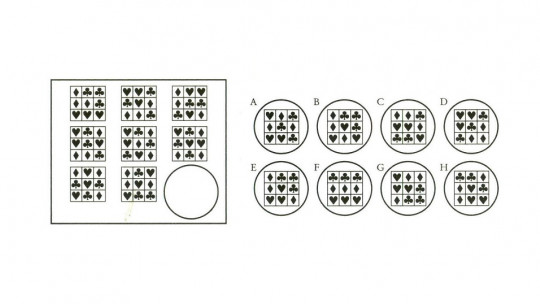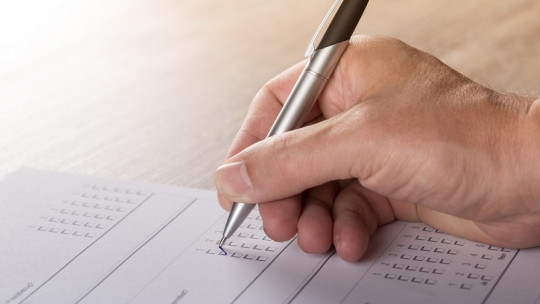Nowadays it is not uncommon to hear that we have to go through a psychotechnician, for example during a personnel selection process in a company. And it is not the only moment in which it will happen to us throughout our lives, being something more frequent and habitual than it may seem. But, What is a psychotechnical test and what does it seek to achieve? Is there more than one type of psychotechnician or are they all the same? In this article we are going to make a brief comment regarding these issues.
What are psychotechnical tests?
Psychotechnical tests are understood to be a type of objective tests designed to objectively evaluate (without the subjectivity of an evaluator mediating the results in obtaining the results) the intellectual abilities of one or more people. These are highly structured tests, with voluntary response controlled by the subject and in which the objective of the test is not masked (it is relatively easy to imagine what is being measured). The responses issued by the subject analyzed will be treated as sincere and true, although these are performance tests that would not be benefited by attempts to vary the responses.
Most of these tests are maximum execution, that is, they They value the maximum potential shown by a subject with respect to a skill or characteristic concrete within a certain time limit. They usually assess general intelligence and aptitudes of the subject being examined, and said assessment may have very different objectives depending on the case. Generally, the aim is to check the adequacy of a person’s abilities to the needs and elements required to access certain permits or positions, or simply to evaluate whether there is any alteration or difficulty in the person’s adaptive functioning.
It is common for them to be taken together with a personality test in order to evaluate not only the cognitive abilities but also the way of being and the usual pattern of thought and behavior of the person analyzed. Subsequently, after analyzing the information obtained by both types of tests, some type of decision can be made. It must be taken into account, however, that the tests themselves they do not offer information beyond a score, which must be interpreted and analyzed based on the subject information available and the comparison with different scales or criteria.
Types of psychotechnical tests
There are different types of psychotechnical tests , since not all of them are aimed at obtaining information on the same aspects nor are they carried out with the same objectives. In this sense, some of the large groups into which we can classify them are the following.
1. Attention and concentration test
These tests They evaluate the ability to remain attentive to a stimulus, maintain fixed attention to the appearance of a specific element or to notice changes or the appearance of alterations. Generally, monotonous tasks are used in which it is easy to get bored and distracted or in which it is difficult to detect a stimulus that is different from the rest.
2. Reasoning test
Organize information, draw conclusions and find solutions quickly It is essential for many jobs and facilitates general adaptation to the events we face on a daily basis. There are multiple ways to evaluate reasoning, some of them being problem solving, planning alternative actions in hypothetical situations or deciding between two options and justifying why. It is also common to have to look for relationships between different stimuli and solve matrices. Spatial, verbal, numerical or mechanical reasoning may be included, in addition to abstract reasoning.
3. Spatial aptitude test
Distinguishing shapes and being able to navigate correctly through space is an ability that helps us orient ourselves and understand what is happening around us. In multiple jobs or when driving, having a certain level of this aptitude is essential. Different visuospatial tests are usually used such as deciding what an object that we see will be like from another perspective or keeping a point within specific margins.
4. Verbal aptitude test
Communicating efficiently, knowing how to understand and express what we think and what other people think at high speed, is essential when dealing with other people. Vocabulary, lexicon, reading and writing speed, grammar and spelling These are some of the aspects examined in this type of test.
5. Numerical aptitude test
Making calculations is very useful in multiple jobs or in our daily lives. numerical aptitude It is generally examined from mathematical problems rules of three or direct calculation (generally they are not excessively complicated unless you are applying for a position that requires great competence in this sector, but rather the number of successes and errors in a specific time is measured).
6. Linked to executive functions
Working memory, decision-making ability, response inhibition, planning and problem solving… all these abilities can be analyzed through different tests. Generally They are used in neuropsychological evaluation and in clinical settings although some can be adapted for other uses.
Areas in which they are applied
If most of us know what a psychotechnical test is, it is because at some point in our lives we have been given one. In fact, today they are very common in different contexts in which it is required to know the mental abilities of a specific person with a specific objective. Among the different possible contexts, some in which they are most frequent are the following.
1. Work scope
The area where we probably most frequently find ourselves needing to pass one of these tests. Companies usually have a series of requirements regarding the skills that their employees must have , so that by passing these tests they can obtain a score in skills such as writing speed, verbal comprehension, lexicon, numerical ability, the ability to solve problems or visuospatial abilities among many others. That is why they are part of most personnel selection processes (although the interview is usually more important).
2. Educational field
Psychotechnicians are also often used in education and training, as a way of observing students’ abilities. They can be used to adjust the level and content to the student’s abilities, see their level of development or whether improvements have occurred over the course of an educational program or even to establish selection criteria for acceptance into some universities or centers.
3. Clinical practice
Another area in which psychometric tests are used is in clinical practice, to evaluate the abilities and aptitudes of patients. This is very useful to assess, for example, the existence of alterations in patients with dementia or other disorders that can generate variations in mental abilities or simply to assess the patient’s current capabilities.
4. Driving license
Driving a vehicle is a great responsibility. We are in control of a powerful and heavy machine that is going to enter circulation and that must be handled with great caution and skill to avoid causing or suffering accidents. That is why an evaluation of the future driver’s skills is required before granting him a permit, to observe his attention and concentration skills, visuoperceptive and visuospatial ability, and reaction capacity.
5. Weapons license
Although much less frequent than the previous two, some people need to carry a firearm. This is the case of police, security guards and hunters. But a gun should not be given to just anyone, as they pose a great responsibility and a great danger to others if not used correctly. For this, different psychometric tests are usually used, among other tests, in order to decide whether or not the requirements to be able to have a weapons license are met.









